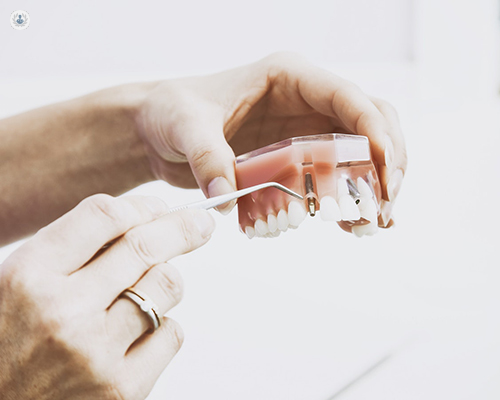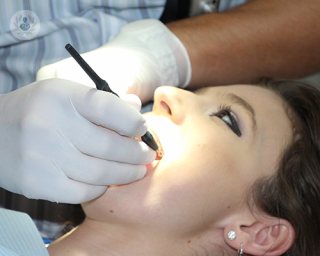Dental implants
Professor Christian Mehl - Dentistry
Created on: 11-13-2012
Updated on: 07-26-2023
Edited by: Carlota Pano
What are dental implants?
A dental implant is the attachment of an artificial component to the jaw bone that replaces the root of a lost tooth. To implant it, the dentist must nail a titanium screw into the maxillary bone, on which a prosthetic crown (an artificial tooth) is placed.
This surgical procedure can be classified into several types, depending on the phases in which it is carried out:
- Immediate dental implants: When the implant is placed immediately after doing the extraction of the tooth, shortening the rehabilitation time and avoiding a second surgery.
- Recent dental implants: When the extraction and the implant take between six and eight weeks.
- Deferred implants: When the dentist first allows for bone regeneration and then for an implant. They wait for about six months.
- Mature dental implants: If more than nine months have elapsed between the two phases.

Why are dental implants needed?
Dental implants are often used to replace missing teeth, and one implanted root can support multiple replacement teeth. Dental implants may also be used to support full or partial dentures.
What does getting a dental implant involve?
The procedure consists of, first of all, carrying out a diagnosis of the patient to prepare a treatment proposal. Diagnostic tests include various imaging tests such as X-rays. Then, plaster models of the possible treatment are made.
The intervention is carried out in several phases.
- First, the implants are placed inside the jaw bone, for which local anaesthetic is provided. The implant is what holds the new tooth.
- Next, fusion of the new implant with the surrounding bone has to take place over time. A temporary artificial tooth may be offered at this time.
- The next phase of the treatment consists of making a small eyelet in the gum to connect the implant that is inside the bone within the oral cavity. To do this, a titanium attachment is screwed into the implant, which is the intermediate step to be able to place the final prosthesis or crown.
Preparation for dental implants
In some cases, before dental implants are inserted, it may be necessary to perform tooth extraction, for example if the tooth has signs of decay or is in a poor position. It might also be necessary to have bone grafting if there is not enough bone in your jaw to support the new dental implant. This added bone is taken either from somewhere else in your body, or from an animal source.
Before the implant is inserted, it is necessary to:
- Quit smoking
- Arrange time off work (a couple of days)
- Buy soft foods for eating after the initial surgery (e.g. soup, smoothies and yoghurt)
Aftercare
In most cases, you can return home the same day after the implant is inserted. Feeling should return to your mouth within a couple of hours. The postoperative period is not very painful and can easily be managed with over-the-counter painkillers. You should only eat soft foods for the first week after implant insertion.
You may suffer from inflammation of the face and perhaps a bruise during the following seven and ten days. During this period, it is important that you take the medication (usually antibiotics) prescribed by your surgeon. In addition, it is important that you: avoid touching the affected area with your tongue; do not drink or smoke; and avoid strenuous activities. If looked after well - with good oral hygiene - dental implants should last as long as your natural teeth.
Alternative treatments
If you do not want dental implants or if you are not a suitable candidate (e.g. if you have gum disease, if you smoke, or if you have diabetes), alternatively, you could choose to have either a bridge (false teeth fixed onto natural teeth either side of a gap) or removable dentures.
















